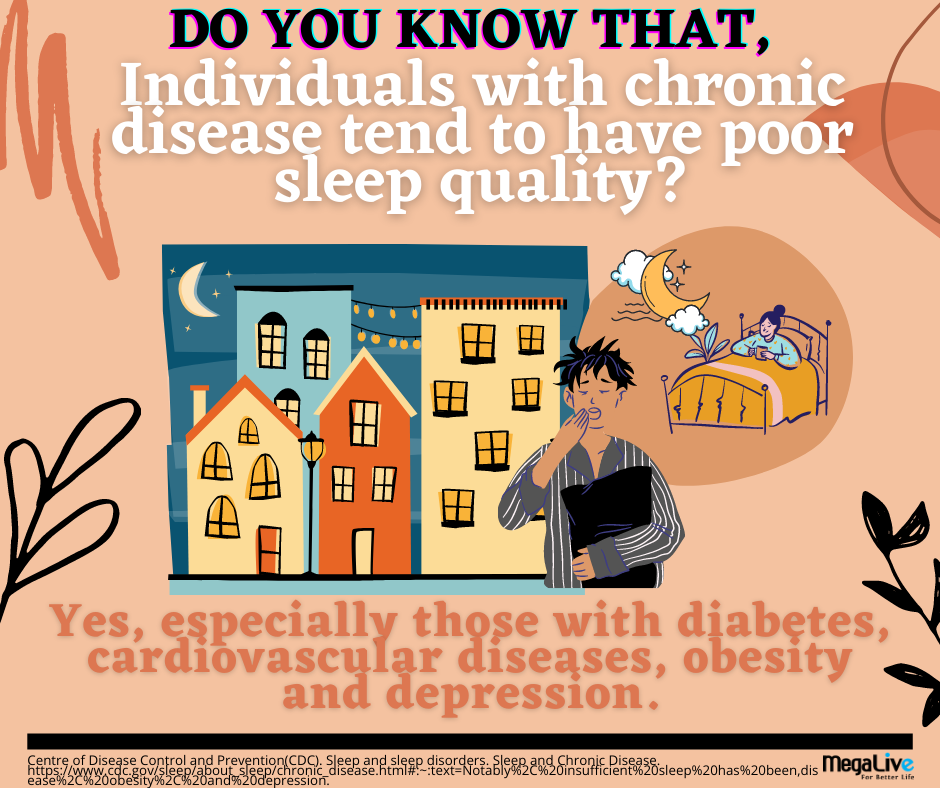Sleep and Chronic Diseases
Sleep is always less likely to be linked with chronic diseases, since many people think that it is something that is not related. However, sleep disturbance might be caused by symptoms of chronic diseases, or the other way around, where sleep disorders can eventually lead to chronic diseases. That is to describe how tight the cycle is between sleep and chronic diseases (1).
Chronic disease is the kind of disease that lasts for a long time, such as Diabetes and Cardiovascular diseases. It usually cannot be cured, so it needs to be managed (1, 2).
Two elements that contribute to sleep disorders are the chronic fatigue and pain that people with chronic illnesses experience on a daily basis. They struggle to get to sleep at night and are sleepy all day as a result of this condition. The depression or anxiety that people with chronic diseases experience in relation to their illness can also be a cause of their nighttime sleep disturbances. Certain medications taken by people with chronic illnesses can occasionally cause conditions that prevent them from falling asleep (1, 2).
Sleep, diabetes, obesity, and cardiovascular diseases.

Diabetes and sleep problems often go hand in hand. Diabetes can cause sleep loss, and not sleeping well can cause diabetes due to frequently eating at night, which will then lead to obesity and various underlying factors (3, 4).
Individuals with diabetes who experience a spike in blood sugar will not have good quality sleep since the kidney is trying hard to excrete the sugar by urinating, so individuals with a spike in blood sugar level will usually experience getting up and going to the toilet all night long (3, 4). Thus, the only solution to this is to control blood glucose levels, eat well during the day, and eventually experience a good sleep at night.
Touching on the fact that not sleeping well can cause diabetes due to frequently eating at night, one study, found that people who get less sleep tend to be heavier than those who sleep well, since being overweight is a risk factor for the development of diabetes (3, 4).
Obese individuals also experience sleep apnea, a condition of sleep disorder indicated by loud snoring and paused breathing when you sleep. The culprit behind this may be the weight gain, which causes fat to deposit around the upper airway and obstruct breathing (3, 4).
There are many effective treatments for sleep apnea. These include lifestyle changes such as weight loss for mild cases and devices to open-up blocked airways for more significant cases (3, 4).
As for sleep and cardiovascular diseases, when we sleep, our blood pressure goes down. This makes our body and mind relax and be calm. However, for individuals with sleep problems, their blood pressure level will stay higher for a long time since it does not get the chance to rest. Thus, prolonged high blood pressure can lead to various heart disease problems, such as stroke (5).

Conclusion
Sleep is as important as eating. It acts as the reset button for the whole-body function. It allows the body's systems to realign, grow, and slow down before it kicks off another day. Thus, do yourself a favour today by getting sufficient quality sleep.
But if you already have trouble sleeping, find out ways to improve it either by managing your underlying health condition that hinders you from getting good sleep or by following some sleeping hygiene techniques in order to train your body and mind to fall asleep. It is not a one-day job; it requires many days, weeks, and perhaps months, but if you are consistent, it will surely have a fruitful result. Happy sleeping, and live your life to the fullest.
References
-
Centre of Disease Control and Prevention (CDC). Sleep and Sleep disorder. Sleep and Chronic Diseases. https://www.cdc.gov/sleep/about_sleep/chronic_disease.html#:~:text=Notably%2C%20insufficient%20sleep%20has%20been,disease%2C%20obesity%2C%20and%20depression. (Accessed on September 11, 2020).
-
Sleep and Chronic Illness. https://www.webmd.com/sleep-disorders/sleep-disorders-sleep-and-chronic-illness (Accessed on September 11, 2020).
-
The Sleep – Diabetes Connection. https://www.webmd.com/diabetes/features/diabetes-lack-of-sleep (Accessed on September 11,2020).
-
Deepak Khandelwal, Deep Dutta, Sachin Chittawar, and Sanjay Kalra (2017). Sleep Disorders in Type 2 Diabetes. Indian J Endocrinol Metab. 21(5): 758–761. DOI: 4103/ijem.IJEM_156_17
-
Centre of Disease Control and Prevention (CDC). How does sleep affects your heart health. https://www.cdc.gov/features/sleep-hearthealth/index.html#:~:text=Adults%20who%20sleep%20less%20than,attack%2C%20asthma%2C%20and%20depression.&text=Some%20of%20these%20health%20problems,High%20blood%20pressure. (Accessed on September 11, 2020).




